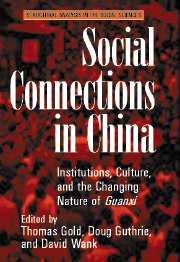Book contents
- Frontmatter
- Contents
- Contributors
- List of Figures and Tables
- Prologue
- Introduction
- Methodological and Conceptual Considerations
- New Substantive Studies of Guanxi
- 4 Guanxi in Business Groups: Social Ties and the Formation of Economic Relations
- 5 Business-State Clientelism in China: Decline or Evolution?
- 6 Institutional Holes and Job Mobility Processes: Guanxi Mechanisms in China's Emergent Labor Markets
- 7 Youth Job Searches in Urban China: The Use of Social Connections in a Changing Labor Market
- 8 Face, Norms, and Instrumentality
- 9 Guanxi and the PRC Legal System: From Contradiction to Complementarity
- 10 “Idle Talk”: Neighborhood Gossip as a Medium of Social Communication in Reform Era Shanghai
- Conclusions
- References
- Index
10 - “Idle Talk”: Neighborhood Gossip as a Medium of Social Communication in Reform Era Shanghai
Published online by Cambridge University Press: 30 July 2009
- Frontmatter
- Contents
- Contributors
- List of Figures and Tables
- Prologue
- Introduction
- Methodological and Conceptual Considerations
- New Substantive Studies of Guanxi
- 4 Guanxi in Business Groups: Social Ties and the Formation of Economic Relations
- 5 Business-State Clientelism in China: Decline or Evolution?
- 6 Institutional Holes and Job Mobility Processes: Guanxi Mechanisms in China's Emergent Labor Markets
- 7 Youth Job Searches in Urban China: The Use of Social Connections in a Changing Labor Market
- 8 Face, Norms, and Instrumentality
- 9 Guanxi and the PRC Legal System: From Contradiction to Complementarity
- 10 “Idle Talk”: Neighborhood Gossip as a Medium of Social Communication in Reform Era Shanghai
- Conclusions
- References
- Index
Summary
INTRODUCTION: GOSSIP AND GUANXI
Early one afternoon (Aug. 27, 2000), I walked into our apartment complex through a narrow gate off a busy thoroughfare in largely working class Northeast Shanghai. The gate is only narrow enough for one person to pass, and at night it is locked. Inside the gate, four retired old men, all over seventy, occupied the two old sofas and several chairs permanently arrayed around the doorway. One white-haired fellow, in a barber chair directly by the door, was having his hair cut by the ancient barber who works at the doorway every day, cutting men's hair for three yuan. Every day, a group of older men and women sit in those sofas watching passersby and chatting. Often their small grandchildren sit with them. As I rounded the corner to enter our own building, a group of retired women and one man were watching the young children play in front of our building. A young mother was hanging her laundry, despite the impending rain. And because it was a rainy day, there were also far fewer people than usual taking in the late afternoon cool outside their apartments. As I walked up the stairs to the fifth floor, I nodded to a neighbor on the stairway. Earlier that day at lunchtime, the neighbor had appeared at our door asking my mother-in-law for a bowl of cooked rice. The neighbors had run out of rice during their meal.
- Type
- Chapter
- Information
- Social Connections in ChinaInstitutions, Culture, and the Changing Nature of Guanxi, pp. 197 - 218Publisher: Cambridge University PressPrint publication year: 2002
- 11
- Cited by

